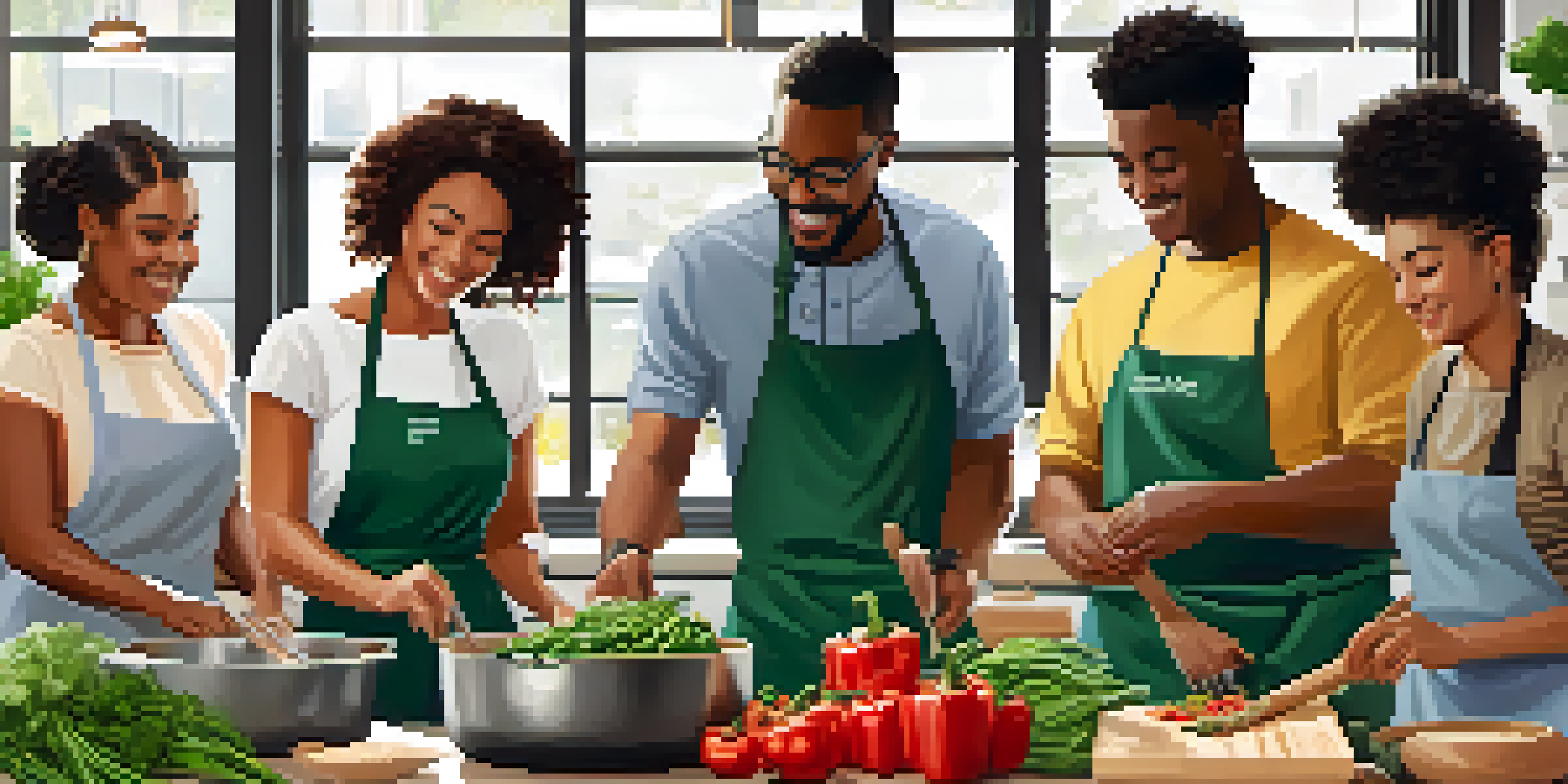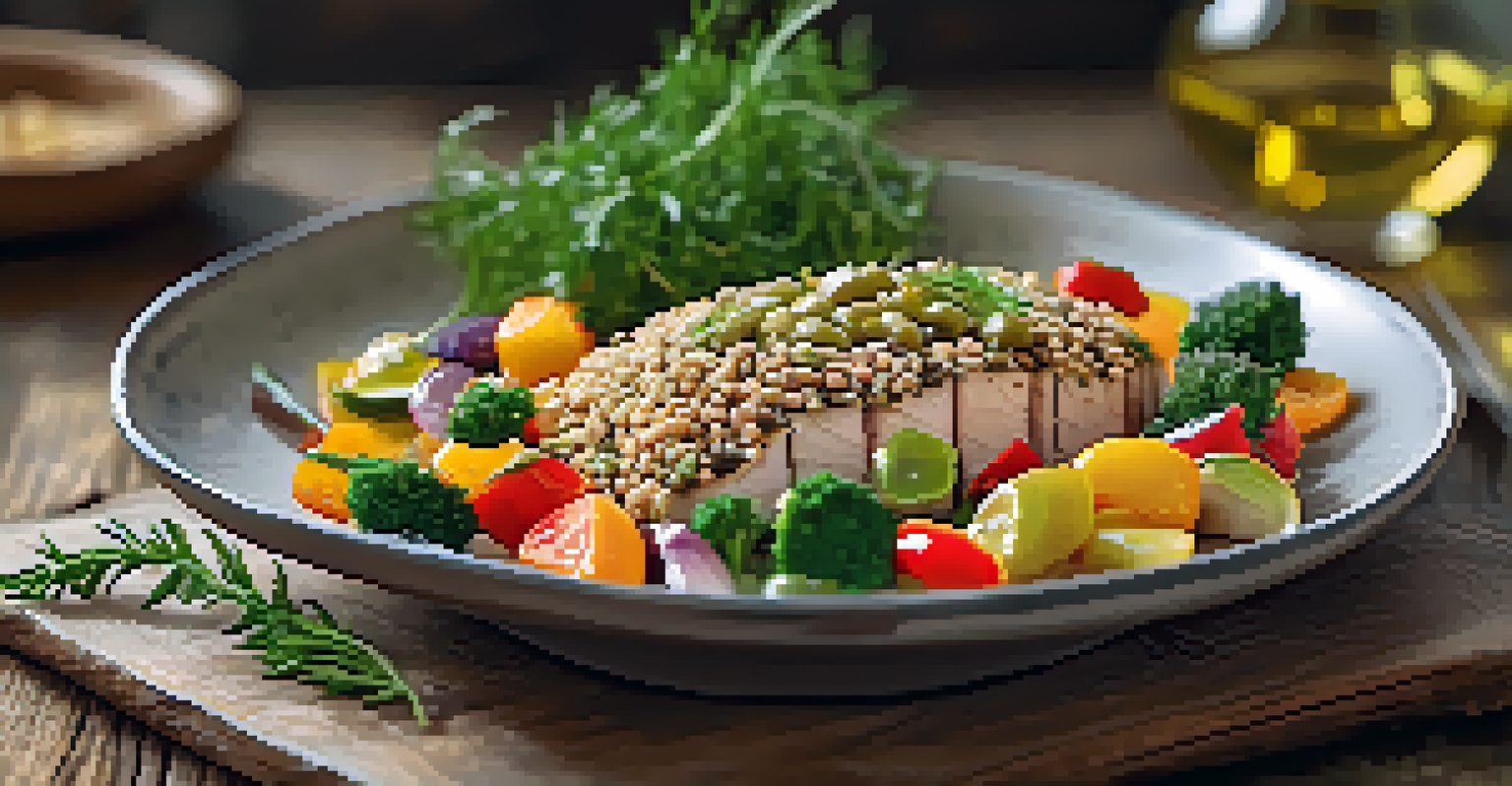Healthy Cooking for Everyone: Inclusive Classes Available

Understanding the Importance of Healthy Cooking
Healthy cooking is more than just a trend; it’s a lifestyle choice that impacts our overall well-being. By preparing nutritious meals, we can improve our energy levels, mood, and even mental clarity. It's about making informed choices that benefit our body, mind, and spirit.
Cooking is like love. It should be entered into with abandon or not at all.
Moreover, healthy cooking is not reserved for a specific group of people. Everyone deserves access to knowledge about nutritious ingredients and cooking techniques, regardless of dietary preferences or restrictions. Understanding how to cook healthily enables individuals to take charge of their health and wellness.
Incorporating healthy cooking into your routine can also foster community and connection. Whether you're cooking for yourself, family, or friends, sharing meals made with wholesome ingredients can create lasting bonds and positive experiences.
The Benefits of Cooking Classes for All Skill Levels
Cooking classes can be a fantastic way to learn new skills, but they also offer a supportive atmosphere for individuals of all skill levels. From beginners to seasoned chefs, everyone can benefit from hands-on experience and expert guidance. This inclusive environment encourages participants to ask questions and explore their culinary interests.

Classes often cover a range of topics, from basic knife skills to advanced cooking techniques. This variety allows individuals to tailor their learning experiences based on their comfort level and interests. Plus, working alongside others can help build confidence and encourage creativity in the kitchen.
Healthy Cooking Enhances Well-Being
Preparing nutritious meals can significantly improve energy levels, mood, and mental clarity.
Another advantage of cooking classes is the opportunity to discover new ingredients and flavors. Participants can learn about local produce, spices, and healthy substitutes that make meals more nutritious and exciting. This exploration can inspire individuals to experiment at home, leading to healthier habits.
Tailored Classes for Dietary Preferences and Needs
Inclusive cooking classes often cater to diverse dietary preferences, including vegetarian, vegan, gluten-free, and more. This ensures that everyone can participate and find dishes that suit their needs. By learning to cook with various ingredients, participants can expand their culinary repertoire while adhering to their dietary restrictions.
The best way to find yourself is to lose yourself in the service of others.
Classes may also focus on specific cuisines or cooking styles, allowing individuals to explore new cultures through food. This exposure can be both educational and enjoyable, as participants gain knowledge about the significance of traditional dishes and cooking methods.
Ultimately, tailored classes empower individuals to make healthier choices that align with their lifestyles. By providing the tools and knowledge needed to cook delicious meals, participants can feel confident in their ability to nourish themselves and their families.
Connecting with Community Through Cooking
Cooking classes can serve as a hub for community engagement, bringing people together to share their passion for food. Participants often form friendships and support networks, creating a sense of belonging that extends beyond the kitchen. This connection can be particularly empowering for individuals who may feel isolated in their cooking journey.
Many classes also incorporate local ingredients, promoting sustainability and supporting community farmers. This not only enriches the cooking experience but also fosters a sense of pride in using fresh, seasonal produce. Participants can learn about the benefits of eating locally and the impact it has on their health and the environment.
Inclusive Classes Cater to All
Cooking classes are designed to accommodate diverse dietary needs and skill levels, making healthy cooking accessible to everyone.
Moreover, cooking together can lead to collaborative meal preparation, where participants can share their own recipes and cooking tips. This exchange of knowledge enhances the learning experience and creates a vibrant community atmosphere that celebrates diversity and inclusivity.
Overcoming Barriers to Healthy Cooking
Many individuals may feel intimidated by the idea of healthy cooking due to perceived barriers such as cost, time, or lack of knowledge. However, inclusive cooking classes aim to dismantle these barriers by providing accessible resources and support. Participants learn that cooking healthily doesn't have to be expensive or time-consuming.
Classes often emphasize budget-friendly meal planning and preparation techniques that save both time and money. By focusing on simple, wholesome ingredients, participants can create delicious meals without breaking the bank. This approach empowers individuals to make healthier choices, even on a tight budget.
Additionally, the collaborative nature of these classes fosters a supportive environment where participants can share their concerns and solutions. By addressing common challenges together, individuals can build confidence and develop practical skills that encourage them to continue cooking healthily at home.
Exploring Global Flavors in Healthy Cooking
One of the most exciting aspects of inclusive cooking classes is the opportunity to explore global flavors and cuisines. Participants can learn about healthy dishes from various cultures, expanding their culinary horizons and understanding the diversity of food. This exploration not only enriches their cooking skills but also cultivates appreciation for different traditions.
Incorporating international recipes can also introduce participants to unique ingredients that offer health benefits. For example, exploring Mediterranean dishes can highlight the use of olive oil, fresh vegetables, and herbs, which are known for their nutritional value. This integration of global flavors encourages creativity and experimentation in the kitchen.
Community Building Through Cooking
Cooking classes foster community engagement and connection, allowing participants to share their passion for food and support each other.
By learning to prepare healthy meals from around the world, individuals can break free from routine cooking habits. This newfound culinary adventure can inspire families to enjoy a wider variety of nutritious meals, making healthy eating a fun and enjoyable experience.
Finding the Right Cooking Class for You
With so many cooking classes available, finding the right one can feel overwhelming. It's essential to consider your personal goals, dietary needs, and preferred cooking styles when selecting a class. Whether you're looking for a casual, hands-on experience or a more structured program, there's something out there for everyone.
Researching local community centers, culinary schools, or online platforms can help you discover diverse options. Many classes offer free trials or introductory sessions, allowing you to gauge the teaching style and class atmosphere before committing. This can be a great way to ensure that the class aligns with your learning preferences.

Lastly, don’t hesitate to ask questions before enrolling. Inquire about class size, instructor experience, and the types of recipes covered. Finding a class that feels welcoming and inclusive can make all the difference in your cooking journey and encourage you to embrace healthy cooking for life.